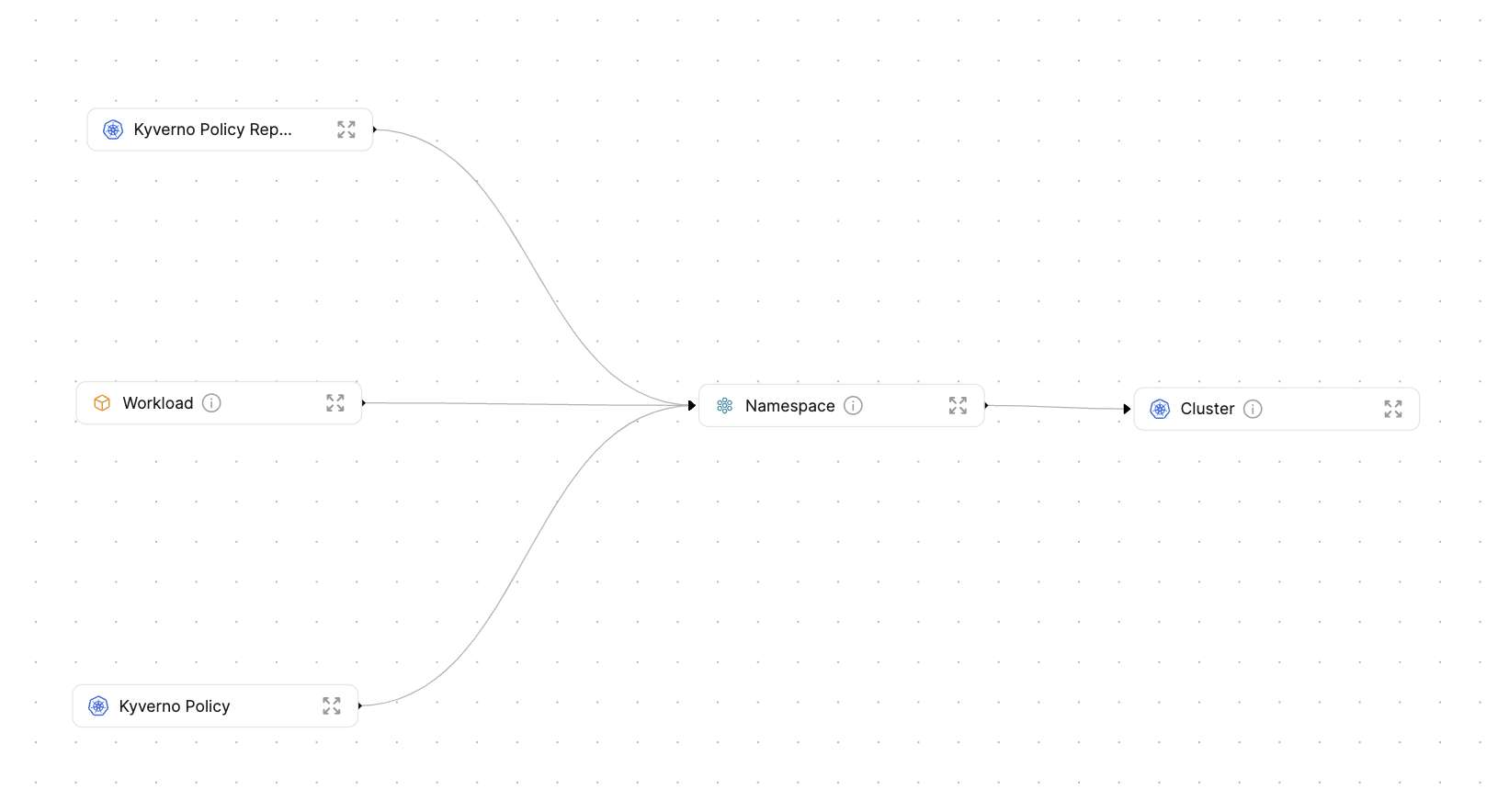Kyverno
Kyverno is a policy engine designed for Kubernetes. Kyverno policies can validate, mutate, generate, and cleanup Kubernetes resources, allowing cluster administrators to enforce configuration best practices for their clusters.
Using Port's Kubernetes Exporter, you can keep track of all Kyverno resources across your different clusters and export all the policies and reports to Port. You will use built in metadata from your kubernetes resources and CRDs to create entities in Port and keep track of their state.
Get to know the basics of our Kubernetes exporter here!

Prerequisites
- This guide assumes you have completed the visualize your services' k8s runtime guide
- Helm must be installed to use the chart. Please refer to Helm's documentation to get started
- The
jqcommand must installed - The
yqcommand must installed - The
kubectlcommand must be installed - Have your Port credentials ready.
In this use-case, you will use a custom bash script which will assist you in the process of installing Port's K8s exporter.
The script will install the helm chart to the Kubernetes cluster which is currently in kubectl context. To view the context name of the cluster the exporter will be installed on, run:
kubectl config current-context
Setting up blueprints & resource mapping
The following section will guide you through the process of setting up your blueprints and resource mapping using the installation script. You can read more about the installation script here.
Creating blueprints
The installation script provides a convenient way to create your blueprints. Using the CUSTOM_BP_PATH environment
variable, you can fetch a pre-defined blueprints.json to create your blueprints. For this use-case, you will
use this file to
define your blueprints. Do this by running:
export CUSTOM_BP_PATH="https://github.com/port-labs/template-assets/blob/main/kubernetes/blueprints/kyverno-blueprints.json"
This blueprints.json file defines the following blueprints:
- Cluster
- Namespace
- Workload
- Kyverno Policy
- Kyverno Policy Report
-
Workloadis an abstraction of Kubernetes objects which create and manage pods. By creating this blueprint, you can avoid creating a dedicated blueprint per Workload type, all of which will likely look pretty similar. Here is the list of kubernetes objectsWorkloadwill represent:- Deployment
- StatefulSet
- DaemonSet
-
Kyverno Policyis one of the most important Kyverno resources, giving developers the capability to set and enforce policy rules in their Kubernetes cluster. -
Kyverno Policy Reportis another important Kyverno resource that contains the results of applying the policies to the Kubernetes cluster.
Below are the Kyverno blueprint schemas used in the exporter:
Kyverno policy blueprint (click to expand)
{
"identifier":"kyvernoPolicy",
"title":"Kyverno Policy",
"icon":"Cluster",
"schema":{
"properties":{
"admission":{
"title":"Admission",
"type":"boolean",
"icon":"DefaultProperty"
},
"background":{
"title":"Background",
"type":"boolean",
"icon":"DefaultProperty"
},
"createdAt":{
"title":"Created At",
"type":"string",
"format":"date-time",
"icon":"DefaultProperty"
},
"validationFailureAction":{
"icon":"DefaultProperty",
"title":"Validation Failure Action",
"type":"string",
"enum":[
"Audit",
"Enforce"
],
"enumColors":{
"Audit":"lightGray",
"Enforce":"lightGray"
}
}
},
"required":[]
},
"mirrorProperties":{},
"calculationProperties":{},
"aggregationProperties":{},
"relations":{
"namespace":{
"title":"Namespace",
"target":"namespace",
"required":false,
"many":false
}
}
}
Kyverno policy report blueprint (click to expand)
{
"identifier":"kyvernoPolicyReport",
"title":"Kyverno Policy Report",
"icon":"Cluster",
"schema":{
"properties":{
"createdAt":{
"title":"Created At",
"type":"string",
"format":"date-time"
},
"pass":{
"title":"Pass",
"type":"number"
},
"fail":{
"title":"Fail",
"type":"number"
},
"warn":{
"title":"Warn",
"type":"number"
},
"error":{
"title":"Error",
"type":"number"
},
"skip":{
"title":"Skip",
"type":"number"
}
},
"required":[]
},
"mirrorProperties":{},
"calculationProperties":{},
"aggregationProperties":{},
"relations":{
"namespace":{
"title":"Namespace",
"target":"namespace",
"required":false,
"many":false
}
}
}
Exporting custom resource mapping
Using the CONFIG_YAML_URL parameter, you can define a custom resource mapping to use when installing the exporter.
In this use-case you will be using the this configuration file. To achieve this, run:
export CONFIG_YAML_URL="https://github.com/port-labs/template-assets/blob/main/kubernetes/templates/kyverno-kubernetes_v1_config.yaml"
Below is the mapping for the Kyverno resources:
Kyverno policy mapping (click to expand)
- kind: kyverno.io/v1/policies
selector:
query: 'true'
port:
entity:
mappings:
- identifier: .metadata.name + "-" + .metadata.namespace + "-" + env.CLUSTER_NAME
title: .metadata.name
icon: '"Cluster"'
blueprint: '"kyvernoPolicy"'
properties:
admission: .spec.admission
background: .spec.background
validationFailureAction: .spec.validationFailureAction
createdAt: .metadata.creationTimestamp
relations:
namespace: .metadata.namespace + "-" + env.CLUSTER_NAME
- kind: kyverno.io/v1/clusterpolicies
selector:
query: 'true'
port:
entity:
mappings:
- identifier: .metadata.name + "-" + env.CLUSTER_NAME
title: .metadata.name
icon: '"Cluster"'
blueprint: '"kyvernoPolicy"'
properties:
admission: .spec.admission
background: .spec.background
validationFailureAction: .spec.validationFailureAction
createdAt: .metadata.creationTimestamp
Kyverno policy report mapping (click to expand)
- kind: wgpolicyk8s.io/v1alpha2/policyreports
selector:
query: 'true'
port:
entity:
mappings:
- identifier: .metadata.name + "-" + .metadata.namespace + "-" + env.CLUSTER_NAME
title: .scope.name
icon: '"Cluster"'
blueprint: '"kyvernoPolicyReport"'
properties:
pass: .summary.pass
fail: .summary.fail
warn: .summary.warn
error: .summary.error
skip: .summary.skip
createdAt: .metadata.creationTimestamp
relations:
namespace: .metadata.namespace + "-" + env.CLUSTER_NAME
- kind: wgpolicyk8s.io/v1alpha2/clusterpolicyreports
selector:
query: 'true'
port:
entity:
mappings:
- identifier: .metadata.name + "-" + env.CLUSTER_NAME
title: .scope.name
icon: '"Cluster"'
blueprint: '"kyvernoPolicyReport"'
properties:
pass: .summary.pass
fail: .summary.fail
warn: .summary.warn
error: .summary.error
skip: .summary.skip
createdAt: .metadata.creationTimestamp
You can now browse to your Port environment to see that your blueprints have been created, and your k8s and Kyverno resources are being reported to Port using the freshly installed k8s exporter.